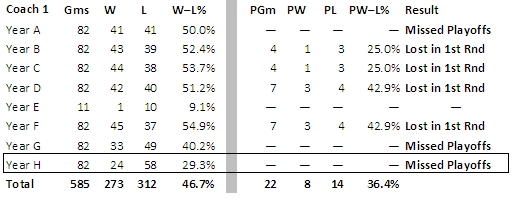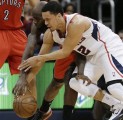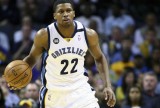Yes Coach.
I scrapped three other posts before I settled on trying to tackle the coaching topic. Given our record, it seemed a bit pointless to work on Bayless starting/bench data, lineup combinations, Evans/Bargnani rebounding and other topics that have been rehashed enough.
Certainly its the time of year to lay blame for what’s been a tough season. But where does the blame lie? The easiest/laziest method is to simply blame the coach. They are the conductors and, if the performance is poor, they should ultimately get the blame. Or should they?
National Post’s Eric Koreen also inspired this post with two of his latest: “Tough to judge Triano given expectations” and “Unplugged: A year of hope in the face of losses“. Over at our forums section, we have no less than three threads on the topic. And I may have had a Twitter debate or two on the topic. I owe to a few people to back up my comments with at least a bit of research.
So how do we measure how much success (or lack thereof) a coach has on a team?
It’s a very difficult question as there are so many factors at play. You fire the coach after a poor record, and usually the team gets a high lottery pick – it can be a big contributor to the following year’s improvement. Plus, other young players have that much more experience and improve significantly year over year. Perhaps two division rivals lose key free agents are are less competitive. Certainly its a complex situation and its very difficult to draw concrete conclusions.
But let’s give it a shot. Below are selected consecutive seasons by two different NBA coaches.
Wow. Let’s judge this coach by their record. In EIGHT years, Coach 1 either: missed the playoffs, lost in the 1st round or was fired after a terrible record. Coach 1 ended “year H” with a 29% winning percentage. You’d fire him, right? Of course you would – for good reason.
How about another example? Here are six seasons from Coach 2, with the fourth year removed.

Another dismal record. His team missed the playoffs three of those years and lost in the 1st round twice. A final year winning percentage of 18%?! How did he ever get to be coach?
You must be on to me by now. Yes, I clipped selected data, but it was consecutive years and is as advertised.
So what happened to these coaches?
Coach 1? Fans and the press largely wanted him fired. “If [Coach 1] didn’t have a master plan last season, he certainly doesn’t have one this season. He overstayed his welcome by about nine months, since the last time I wrote that he needed to go. And now he’s gone” wrote one of the most popular writers (source, but don’t peek yet). But he wasn’t let go. He must have followed it up by yet another lousy season right?!
“Coach 1” is Doc Rivers, who guided the Boston Celtics to the NBA Championship finals and won… the year following that outrage. That summer he must have made the most significant coaching improvement of all time right? He even won Coach of the Month 3 times that year.
Or perhaps it has something to do with the Celtics adding a couple players to their roster: Kevin Garnett and Ray Allen.
What about “Coach 2” and the missing Year D? You guessed it:
![]()
Coach is, of course, Pat Riley, who took over from Stan Van Gundy after 21 games. Third year player Dwyane Wade had emerged to a 27/7/6 player while Shaquille O’Neal came off injury around the time Riley took over.
So what does this prove? Not much. But it does suggest that the quality of players is the most important driver of wins and losses. Would the 05/06 Miami team be NBA Champs without Riley? Perhaps not. Could another coach have led a healthy Shaq and Dwayne Wade to a very good record and deep into the playoffs? Likely. It also suggests that having a young (inexperienced) core with a good scorer, but not great defender (Pierce) just may have a difficult winning even under a coach who eventually won it all. (Youth, inexperience, great scorer/poor defender – sound familiar?)
The Wealth of Coaching
David J. Berri, of Wins Produced fame – along with Martin Schmidt – wrote about this coaching topic in their book “Stumbing on Wins“. I encourage you to read the whole chapter to understand their methodology but the conclusion was:
Of the 62 coaches studied, 42 – or 68% – didn’t have a statistically significant positive impact on player performance.
The study suggested only a few coaches could alter player performance. Topping the list of coaches that do is none other than Phil Jackson, followed closely by Gregg Popovich.
[For further commentary the study see Slate.com’s “Why hiring a new coach won’t solve your favorite NBA team’s problems.” and Kevin Pelton’s article at Basketball Prospectus.]
Recent data on the impact of coaching changes
Over at every cool stats guy’s favourite site, APBR Metrics Forum, we found a study of the impact of coaching changes from 2008-2010.
The author found:
- Before a coaching change, the teams have a cumulative W-L% of 42.0%
- The cumulative record in the intial year of change? Dropped to 38.1%
- The cumulative record 2 years after the changes? 43.4%
One conclusion:
Many replacement coaches failed to deliver additional wins in situations that appeared to be locks for progress.
So what should the Raptors do?
As Kevin Pelton puts it “evaluating coaches [is] an extremely difficult task for statistical analysts in all sports.” It appears from the data I presented above this is certainly the case. However, we hopefully convinced the reader that a large portion of coaching changes have not made a significant impact on a team. It most often comes down to the personnel on the floor.
One of my frustrations in debating the merits of the Raptors changing coaching is the complete lack of any candidates put forward by those in the “change” camp. Shouldn’t it kinda sorta matter who’s coming in?! I think we at least presented that argument well.
The Raptors have lost 200 man games to injuries this year which has contributed to 23 different starting lineups used. They have had 22 different players on their roster. They have also used the youngest starting lineup in franchise history.
Questions:
- 1) Will the Raptors roster improve somewhat with stability (and hopefully less injuries)?
2) Is stability important? Do systems (esp. given all the different personnel this year) take time to implement
3) Will the Raptors roster improve somewhat with the increased experience from this young roster?
4) Should the Raptors make a coaching change? If so, who is realistically available? Argue why they would significantly improve the team with current personnel (our high draft pick should also help next year).
Questions? Email me: tomliston@gmail.com or find me on Twitter.






